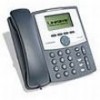Linksys SPA922 Cisco SPA9000 Voice System Administration Guide - Page 191
Using the Upgrade URL, Upgrade Enable, Voice > Provisioning
 |
UPC - 745883570836
View all Linksys SPA922 manuals
Add to My Manuals
Save this manual to your list of manuals |
Page 191 highlights
Advanced Topics in SPA9000 Administration Remote Provisioning Features A The 200 reply sent by the SPA9000 to the client station REGISTER request includes a DATE header that the client station can use to synchronize with its local real-time clock. The time served in the DATE header is the local time (as opposed to GMT). There is thus no need to configure an NTP server or a time zone on the client stations. This assumes that the SPA9000 can maintain the real-time clock based on an NTP server or a DATE header supplied by the ITSP. Following is an example of a 200 response to REGISTER (note that there is no weekday in the DATE header): SIP/2.0 200 OK To: "User-A" ;tag=41a7-0 From: "User-A" ;tag=8d0bd416dc8a7ec2o0 Call-ID: [email protected] CSeq: 1 REGISTER Via: SIP/2.0/UDP 192.168.0.4:5060;branch=z9hG4bK-e62fe987 Contact: sip:[email protected]:5060;expires=3600 Content-Length: 0 Date: Mon, 18 Jul 2005 14:39:40 PST Using the Upgrade URL Remote firmware upgrade is achieved via TFTP or HTTP (firmware upgrades using HTTPS are not supported). Remote upgrades are controlled by configuring the desired firmware image URL into the SPA9000 via a remote profile resync. NOTE To use this feature, the Upgrade Enable field on the Voice > Provisioning page must be set to Yes. SYNTAX: http://spa-ip-addr/admin/upgrade?[protocol://][servername[:port]][/firmware-pathname] EXAMPLE: http://192.168.2.217/admin/upgrade?tftp:// 192.168.2.251/spaconf.cfg Both HTTP and TFTP are supported for the upgrade operation. • If no protocol is specified, TFTP is assumed. If no server-name is specified, the host that requests the URL is used as server-name. • If no port specified, the default port of the protocol is used. (69 for TFTP or 80 for HTTP) • The firmware-pathname is typically the file name of the binary located in a directory on the TFTP or HTTP server. If no firmware-pathname is specified, / SPA9000 Voice System Administration Guide 189















